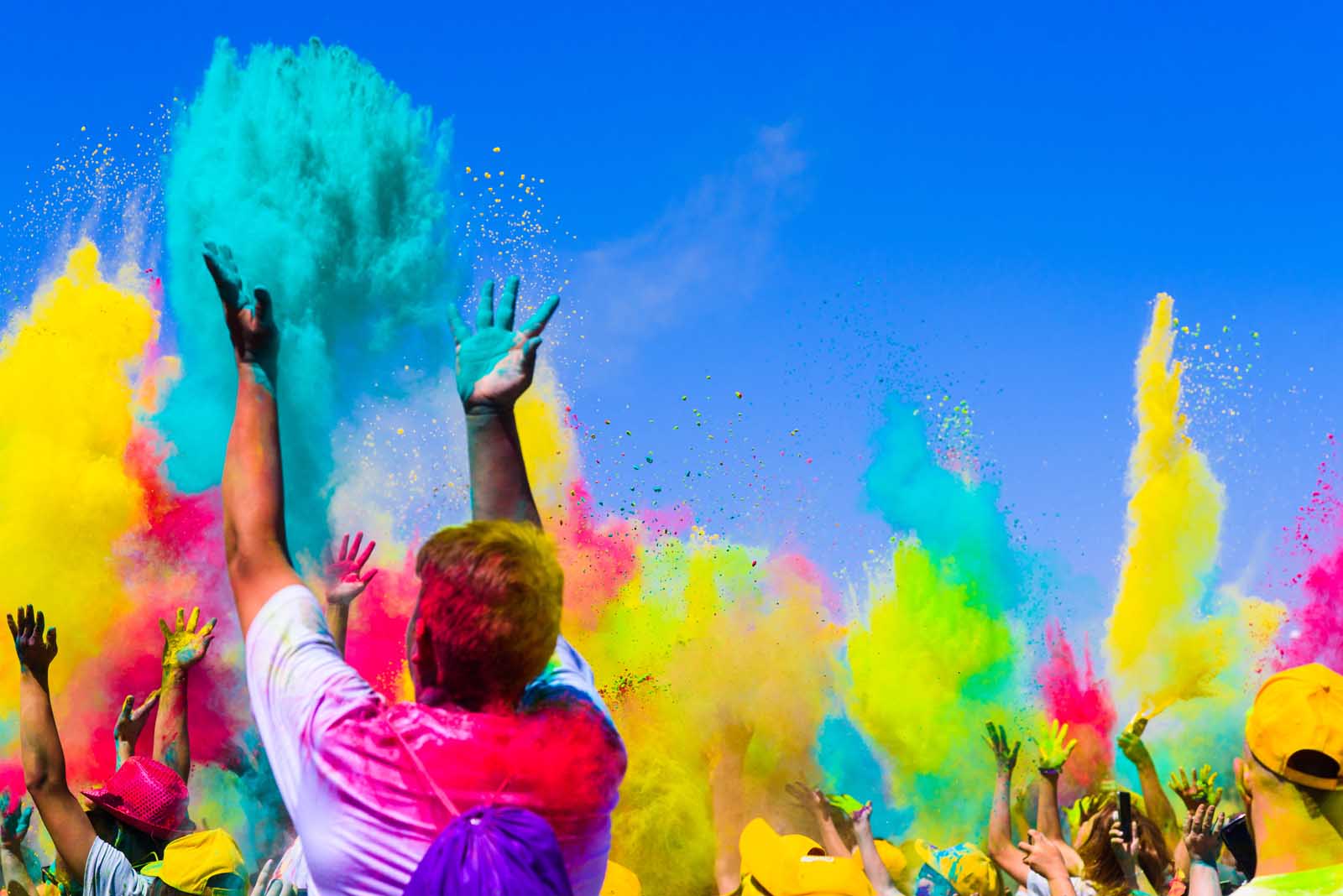Summary of Holi Festival in India
- When is Holi Celebrated? Holi occurs on March 25 and 26 in 2024, marking the start of spring.
- How Long is Holi Celebrated? The festival lasts for two days, starting with Holika Dahan followed by the main festivities.
- What is the Significance of Holi? Holi symbolizes love, joy, and the victory of good over evil through vibrant colors.
When is Holi India Celebrated?
In 2024, Holi will happen on March 25 and 26. The key celebrations occur on March 25, while the Holika Dahan ritual takes place on March 7. Since the dates shift yearly, Holi is celebrated on the full moon day of the Hindu month Phalguna (typically March), marking the beginning of spring.
How Long is Holi Celebrated?
Holi celebrations span two days, starting with Holika Dahan, also known as Little Holi, dedicated to bonfires. The second day features traditional color throwing, beginning in the morning. However, the festival atmosphere often starts well in advance, with music and dance filling the streets days before.
What is Holi Festival?
Known as the festival of colors, Holi celebrates love and joy through vibrant powders and colored water. By the end of the day, everyone is adorned with colorful hues, creating a sense of unity as caste, creed, and religion fade away, and revelers come together to enjoy the festivities.
The Bonfire of Holika Dahan
On the eve of Holi, Holika Dahan is observed. Many days prior, people gather wood, conducting rituals surrounding large bonfires. This event symbolizes the destruction of the demon Holika and signifies the victory of good over evil.
Holika vs Lord Vishnu
The tale of Holika involves her brother, the Demon King Hiranyakashipu, who sought to kill his devoted son Prahlada. When Holika attempted to burn Prahlada with her immunity to fire, she was punished by the Gods, allowing him to prevail, symbolizing the triumph of good.
During Holika Dahan, individuals ignite bonfires, celebrating good’s victory, accompanied by dancing and merriment late into the night.
Holi India
Tourists are warmly welcomed to participate in Holi festivities. The celebration includes water guns, balloons, and colorful powders, leaving participants joyfully covered. The experience can be messy, but it’s an integral part of the fun.
How is Holi Celebrated
Holi is a celebration of love, represented through vibrant colors. In Hindu temples, both locals and tourists are invited to join in the joy. This day encourages letting go of societal prejudices, fostering inclusiveness and unity.
Interactions are typically gender-segregated, yet everyone dances together, joining the celebrations regardless of background.
Where to Celebrate Holi in India?
India offers various locations to celebrate Holi, with Mathura being a prominent choice as it is Lord Krishna’s birthplace. The vibrant celebrations feature processions and customs unique to the region.
Uttar Pradesh
Mathura is renowned for its captivating Holi week celebrations, featuring lively processions and temple rituals. Vrindavan, closely situated, also celebrates with floral traditions, making it popular among pilgrims.
Delhi hosts the spirited Holi Cow Festival, while Agra celebrations coincide with visits to the iconic Taj Mahal, guaranteeing a vibrant experience.
Rajasthan
Jaipur celebrates a magnificent elephant festival, leading up to the colorful events. Udaipur is deemed India’s most beautiful city, offering picturesque Holi celebrations along Lake Pichola, with the stunning Taj Lake Palace as a backdrop.
Pushkar also comes alive with music festivals, pool parties, and traditional color festivities.
Goa
Though less celebrated than in the North, Holi’s popularity draws travelers to Goa for colorful festivities.
West Bengal
Dol Jatra, observed in West Bengal, mirrors Holi traditions, celebrating the romance of Krishna and Radha through the playful use of colors.
Mumbai
Mumbai offers a unique twist with the Holi Pot competition, inviting all to join in the vibrant celebration.
Hampi
Hampi, a UNESCO World Heritage site, embraces Holi within its historic temples, creating a magical atmosphere for visitors.
Our Traditional Holi Celebrations in Mathura
Mathura is distinguished for its spirited Holi celebrations, being the birthplace of Lord Krishna. This city’s traditions reflect the joy that Krishna spread during his childhood, inspiring many to partake in the festivities.
Arriving in Mathura a day prior, we quickly found a guest house despite the high demand during Holi, ensuring we could soak in the experience fully.
Tips for Celebrating Holi Festival
Mathura hosts numerous events, but finding the central festivities may require navigating through neighborhoods. Asking locals or your guest house staff will guide you towards the heart of the celebrations.
How to Dress for Holi Festival
Opt for clothing you’re willing to discard, as they will likely be stained. Wear protective sunglasses and consider hairstyles that minimize exposure to color.
Leave valuables behind, as the celebration can be chaotic. Since Holi is messy, utilizing waterproof gear for cameras is also crucial.
Staying Safe at Holi Festival
While enjoying Holi, it’s essential to remain alert as some festival-goers can be overly exuberant. Ensure a meetup spot is established in case you become separated in the crowds.
It’s advisable to plan accommodation ahead of time, especially in popular locations, to avoid overwhelming challenges upon arrival.
What are Some Holi Rituals?
Holi, rooted in ancient traditions, encompasses various rituals, including special prayers and food preparation. Popular traditional foods include:
- Thandi – A refreshing milk-based drink
- Gujiya – A crispy dessert
- Mathri – A sweet flaky biscuit
- Lassi – A fruit-infused yogurt drink
This festive time encourages forgiveness and the mending of relationships.
The Clean Up after Holi Festival
The post-Holi cleanup can be arduous as vibrant colors cling to skin and hair. We found ourselves scrubbing stubborn stains, and while the experience left us a little worse for wear, the joy of participation made it all worthwhile.




